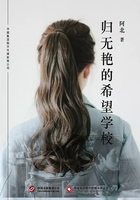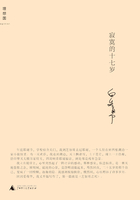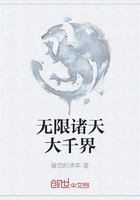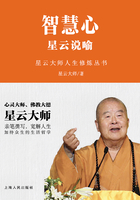Philip passed the next two years with comfortable monotony. He was not bullied more than other boys of his size; and his deformity, withdrawing him from games, acquired for him an insignificance for which he was grateful. He was not popular, and he was very lonely. He spent a couple of terms with Winks in the Upper Third. Winks, with his weary manner and his drooping eyelids, looked infinitely bored. He did his duty, but he did it with an abstracted mind. He was kind, gentle, and foolish. He had a great belief in the honour of boys; he felt that the first thing to make them truthful was not to let it enter your head for a moment that it was possible for them to lie. “Ask much,” he quoted, “and much shall be given to you.” Life was easy in the Upper Third. You knew exactly what lines would come to your turn to construe, and with the crib that passed from hand to hand you could find out all you wanted in two minutes; you could hold a Latin Grammar open on your knees while questions were passing round; and Winks never noticed anything odd in the fact that the same incredible mistake was to be found in a dozen different exercises. He had no great faith in examinations, for he noticed that boys never did so well in them as in form: it was disappointing, but not significant. In due course they were moved up, having learned little but a cheerful effrontery in the distortion of truth, which was possibly of greater service to them in after life than an ability to read Latin at sight.
Then they fell into the hands of Tar. His name was Turner; he was the most vivacious of the old masters, a short man with an immense belly, a black beard turning now to gray, and a swarthy skin. In his clerical dress there was indeed something in him to suggest the tar-barrel; and though on principle he gave five hundred lines to any boy on whose lips he overheard his nickname, at dinner-parties in the precincts he often made little jokes about it. He was the most worldly of the masters; he dined out more frequently than any of the others, and the society he kept was not so exclusively clerical. The boys looked upon him as rather a dog. He left off his clerical attire during the holidays and had been seen in Switzerland in gay tweeds. He liked a bottle of wine and a good dinner, and having once been seen at the Cafe Royal with a lady who was very probably a near relation, was thenceforward supposed by generations of schoolboys to indulge in orgies the circumstantial details of which pointed to an unbounded belief in human depravity.
Mr. Turner reckoned that it took him a term to lick boys into shape after they had been in the Upper Third; and now and then he let fall a sly hint, which showed that he knew perfectly what went on in his colleague's form. He took it good-humouredly. He looked upon boys as young ruffians who were more apt to be truthful if it was quite certain a lie would be found out, whose sense of honour was peculiar to themselves and did not apply to dealings with masters, and who were least likely to be troublesome when they learned that it did not pay. He was proud of his form and as eager at fifty-five that it should do better in examinations than any of the others as he had been when he first came to the school. He had the choler of the obese, easily roused and as easily calmed, and his boys soon discovered that there was much kindliness beneath the invective with which he constantly assailed them. He had no patience with fools, but was willing to take much trouble with boys whom he suspected of concealing intelligence behind their wilfulness. He was fond of inviting them to tea; and, though vowing they never got a look in with him at the cakes and muffins, for it was the fashion to believe that his corpulence pointed to a voracious appetite, and his voracious appetite to tapeworms, they accepted his invitations with real pleasure.
Philip was now more comfortable, for space was so limited that there were only studies for boys in the upper school, and till then he had lived in the great hall in which they all ate and in which the lower forms did preparation in a promiscuity which was vaguely distasteful to him. Now and then it made him restless to be with people and he wanted urgently to be alone. He set out for solitary walks into the country. There was a little stream, with pollards on both sides of it, that ran through green fields, and it made him happy, he knew not why, to wander along its banks. When he was tired he lay face-downward on the grass and watched the eager scurrying of minnows and of tadpoles. It gave him a peculiar satisfaction to saunter round the precincts. On the green in the middle they practised at nets in the summer, but during the rest of the year it was quiet: boys used to wander round sometimes arm in arm, or a studious fellow with abstracted gaze walked slowly, repeating to himself something he had to learn by heart. There was a colony of rooks in the great elms, and they filled the air with melancholy cries. Along one side lay the Cathedral with its great central tower, and Philip, who knew as yet nothing of beauty, felt when he looked at it a troubling delight which he could not understand. When he had a study (it was a little square room looking on a slum, and four boys shared it), he bought a photograph of that view of the Cathedral, and pinned it up over his desk. And he found himself taking a new interest in what he saw from the window of the Fourth Form room. It looked on to old lawns, carefully tended, and fine trees with foliage dense and rich. It gave him an odd feeling in his heart, and he did not know if it was pain or pleasure. It was the first dawn of the aesthetic emotion. It accompanied other changes. His voice broke. It was no longer quite under his control, and queer sounds issued from his throat.
Then he began to go to the classes which were held in the headmaster's study, immediately after tea, to prepare boys for confirmation. Philip's piety had not stood the test of time, and he had long since given up his nightly reading of the Bible; but now, under the influence of Mr. Perkins, with this new condition of the body which made him so restless, his old feelings revived, and he reproached himself bitterly for his backsliding. The fires of Hell burned fiercely before his mind's eye. If he had died during that time when he was little better than an infidel he would have been lost; he believed implicitly in pain everlasting, he believed in it much more than in eternal happiness; and he shuddered at the dangers he had run.
Since the day on which Mr. Perkins had spoken kindly to him, when he was smarting under the particular form of abuse which he could least bear, Philip had conceived for his headmaster a dog-like adoration. He racked his brains vainly for some way to please him. He treasured the smallest word of commendation which by chance fell from his lips. And when he came to the quiet little meetings in his house he was prepared to surrender himself entirely. He kept his eyes fixed on Mr. Perkins' shining eyes, and sat with mouth half open, his head a little thrown forward so as to miss no word. The ordinariness of the surroundings made the matters they dealt with extraordinarily moving. And often the master, seized himself by the wonder of his subject, would push back the book in front of him, and with his hands clasped together over his heart, as though to still the beating, would talk of the mysteries of their religion. Sometimes Philip did not understand, but he did not want to understand, he felt vaguely that it was enough to feel. It seemed to him then that the headmaster, with his black, straggling hair and his pale face, was like those prophets of Israel who feared not to take kings to task; and when he thought of the Redeemer he saw Him only with the same dark eyes and those wan cheeks.
Mr. Perkins took this part of his work with great seriousness. There was never here any of that flashing humour which made the other masters suspect him of flippancy. Finding time for everything in his busy day, he was able at certain intervals to take separately for a quarter of an hour or twenty minutes the boys whom he was preparing for confirmation. He wanted to make them feel that this was the first consciously serious step in their lives; he tried to grope into the depths of their souls; he wanted to instil in them his own vehement devotion. In Philip, notwithstanding his shyness, he felt the possibility of a passion equal to his own. The boy's temperament seemed to him essentially religious. One day he broke off suddenly from the subject on which he had been talking.
“Have you thought at all what you're going to be when you grow up?” he asked.
“My uncle wants me to be ordained,” said Philip.
“And you?”
Philip looked away. He was ashamed to answer that he felt himself unworthy.
“I don't know any life that's so full of happiness as ours. I wish I could make you feel what a wonderful privilege it is. One can serve God in every walk, but we stand nearer to Him. I don't want to influence you, but if you made up your mind — oh, at once — you couldn't help feeling that joy and relief which never desert one again.”
Philip did not answer, but the headmaster read in his eyes that he realised already something of what he tried to indicate.
“If you go on as you are now you'll find yourself head of the school one of these days, and you ought to be pretty safe for a scholarship when you leave. Have you got anything of your own?”
“My uncle says I shall have a hundred a year when I'm twenty-one.”
“You'll be rich. I had nothing.”
The headmaster hesitated a moment, and then, idly drawing lines with a pencil on the blotting paper in front of him, went on.
“I'm afraid your choice of professions will be rather limited. You naturally couldn't go in for anything that required physical activity.”
Philip reddened to the roots of his hair, as he always did when any reference was made to his club-foot. Mr. Perkins looked at him gravely.
“I wonder if you're not oversensitive about your misfortune. Has it ever struck you to thank God for it?”
Philip looked up quickly. His lips tightened. He remembered how for months, trusting in what they told him, he had implored God to heal him as He had healed the Leper and made the Blind to see.
“As long as you accept it rebelliously it can only cause you shame. But if you looked upon it as a cross that was given you to bear only because your shoulders were strong enough to bear it, a sign of God's favour, then it would be a source of happiness to you instead of misery.”
He saw that the boy hated to discuss the matter and he let him go.
But Philip thought over all that the headmaster had said, and presently, his mind taken up entirely with the ceremony that was before him, a mystical rapture seized him. His spirit seemed to free itself from the bonds of the flesh and he seemed to be living a new life. He aspired to perfection with all the passion that was in him. He wanted to surrender himself entirely to the service of God, and he made up his mind definitely that he would be ordained. When the great day arrived, his soul deeply moved by all the preparation, by the books he had studied and above all by the overwhelming influence of the head, he could hardly contain himself for fear and joy. One thought had tormented him. He knew that he would have to walk alone through the chancel, and he dreaded showing his limp thus obviously, not only to the whole school, who were attending the service, but also to the strangers, people from the city or parents who had come to see their sons confirmed. But when the time came he felt suddenly that he could accept the humiliation joyfully; and as he limped up the chancel, very small and insignificant beneath the lofty vaulting of the Cathedral, he offered consciously his deformity as a sacrifice to the God who loved him.















